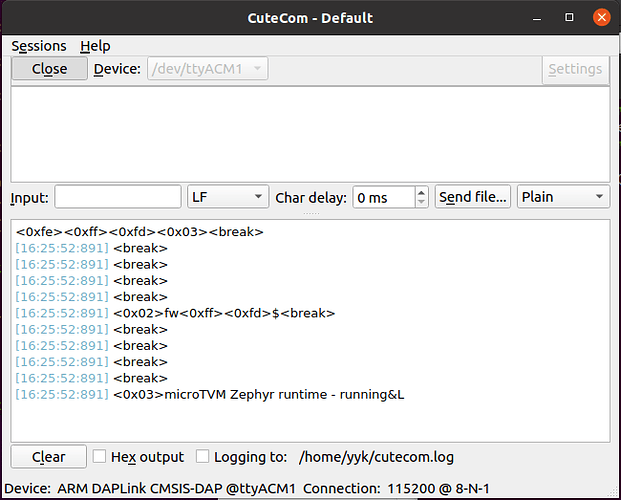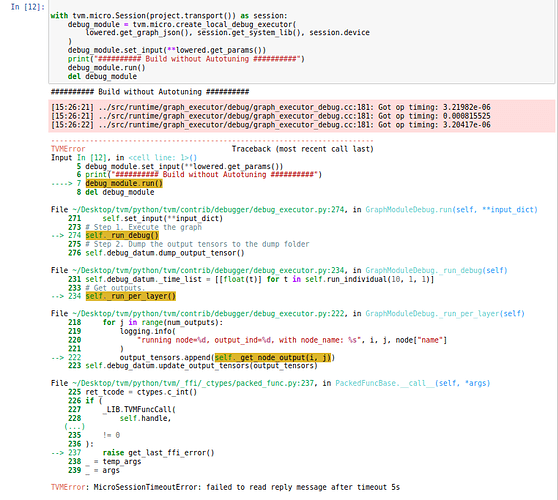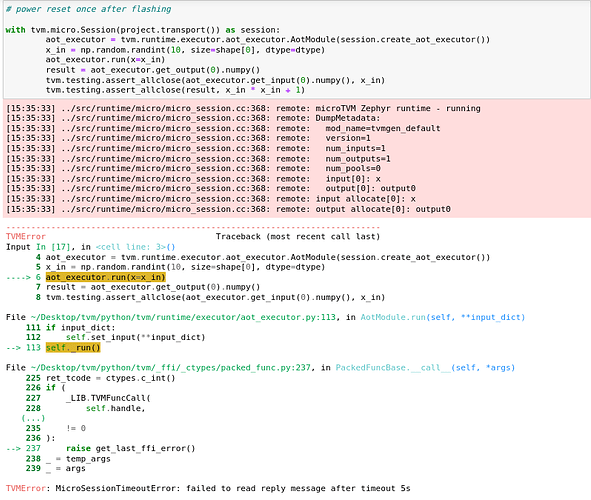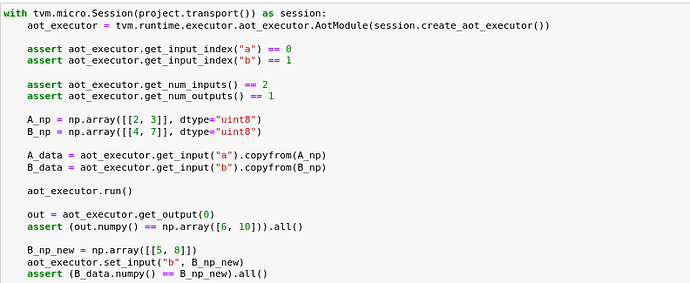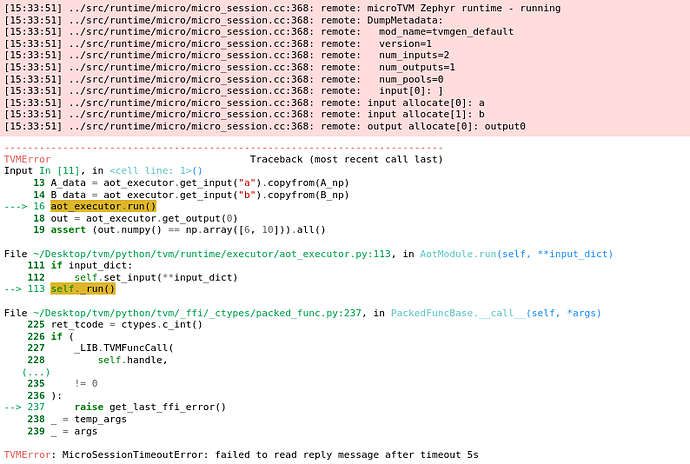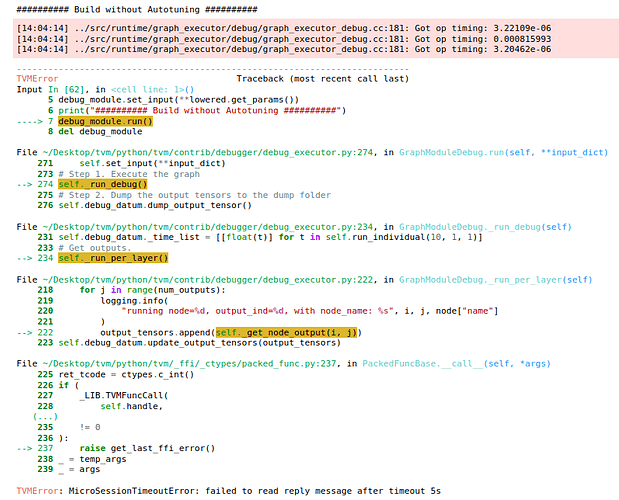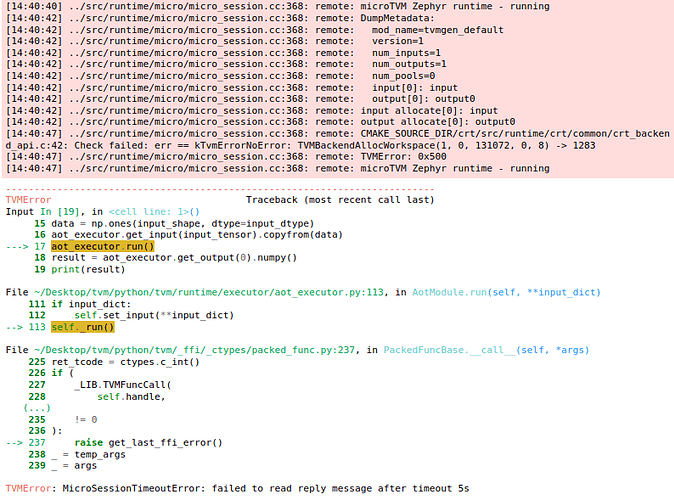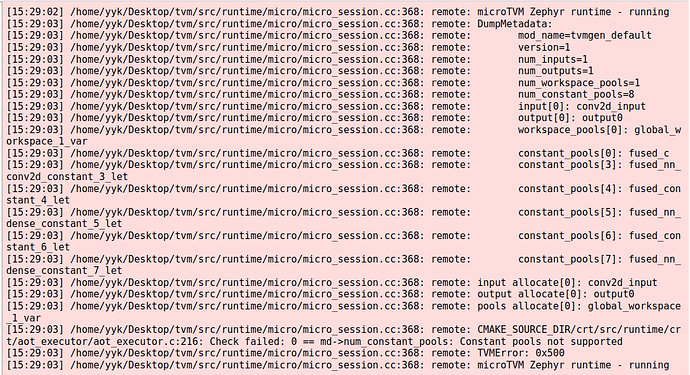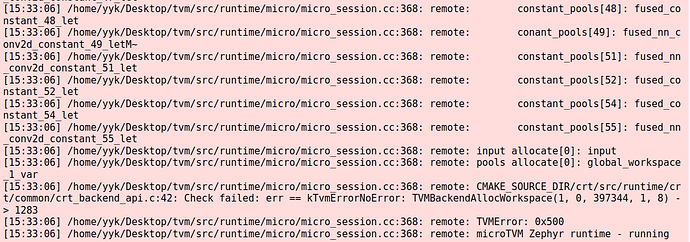And then I tried another example:https://tvm.apache.org/docs/how_to/work_with_microtvm/micro_autotune.html, there are also some problem.
I don’t modify the code in the example except the board config.
boards[BOARD]
{'board': 'mimxrt1060_evk',
'model': 'imxrt10xx',
'is_qemu': False,
'fpu': True,
'vid_hex': '0d28',
'pid_hex': '0204'}
And I get this result for auto-tuning code
in terminal:
Current/Best: 0.00/ 0.00 MFLOPS | Progress: (0/10) | 0.00 s
model/codegen/host/src/lib1.c: In function ‘default_function’:
model/codegen/host/src/lib1.c:24:9: warning: unused variable ‘arg_data_shape’ [-Wunused-variable]
24 | void* arg_data_shape = (((DLTensor*)arg_data)[0].shape);
| ^~~~~~~~~~~~~~
model/codegen/host/src/lib1.c:21:9: warning: unused variable ‘arg_kernel_shape’ [-Wunused-variable]
21 | void* arg_kernel_shape = (((DLTensor*)arg_kernel)[0].shape);
| ^~~~~~~~~~~~~~~~
model/codegen/host/src/lib1.c:17:9: warning: unused variable ‘arg_conv2d_NCHWc_shape’ [-Wunused-variable]
17 | void* arg_conv2d_NCHWc_shape = (((DLTensor*)arg_conv2d_NCHWc)[0].shape);
| ^~~~~~~~~~~~~~~~~~~~~~
model/codegen/host/src/lib1.c:15:11: warning: unused variable ‘arg_data_code’ [-Wunused-variable]
15 | int32_t arg_data_code = arg_type_ids[2];
| ^~~~~~~~~~~~~
model/codegen/host/src/lib1.c:13:11: warning: unused variable ‘arg_kernel_code’ [-Wunused-variable]
13 | int32_t arg_kernel_code = arg_type_ids[1];
| ^~~~~~~~~~~~~~~
model/codegen/host/src/lib1.c:11:11: warning: unused variable ‘arg_conv2d_NCHWc_code’ [-Wunused-variable]
11 | int32_t arg_conv2d_NCHWc_code = arg_type_ids[0];
| ^~~~~~~~~~~~~~~~~~~~~
Current/Best: 359.22/ 359.22 MFLOPS | Progress: (1/10) | 4.82 s
microTVM runtime: 0-length read, exiting!
model/codegen/host/src/lib1.c: In function ‘default_function’:
model/codegen/host/src/lib1.c:24:9: warning: unused variable ‘arg_data_shape’ [-Wunused-variable]
24 | void* arg_data_shape = (((DLTensor*)arg_data)[0].shape);
| ^~~~~~~~~~~~~~
model/codegen/host/src/lib1.c:21:9: warning: unused variable ‘arg_kernel_shape’ [-Wunused-variable]
21 | void* arg_kernel_shape = (((DLTensor*)arg_kernel)[0].shape);
| ^~~~~~~~~~~~~~~~
model/codegen/host/src/lib1.c:17:9: warning: unused variable ‘arg_conv2d_NCHWc_shape’ [-Wunused-variable]
17 | void* arg_conv2d_NCHWc_shape = (((DLTensor*)arg_conv2d_NCHWc)[0].shape);
| ^~~~~~~~~~~~~~~~~~~~~~
model/codegen/host/src/lib1.c:15:11: warning: unused variable ‘arg_data_code’ [-Wunused-variable]
15 | int32_t arg_data_code = arg_type_ids[2];
| ^~~~~~~~~~~~~
model/codegen/host/src/lib1.c:13:11: warning: unused variable ‘arg_kernel_code’ [-Wunused-variable]
13 | int32_t arg_kernel_code = arg_type_ids[1];
| ^~~~~~~~~~~~~~~
model/codegen/host/src/lib1.c:11:11: warning: unused variable ‘arg_conv2d_NCHWc_code’ [-Wunused-variable]
11 | int32_t arg_conv2d_NCHWc_code = arg_type_ids[0];
| ^~~~~~~~~~~~~~~~~~~~~
Current/Best: 276.81/ 359.22 MFLOPS | Progress: (2/10) | 7.82 s
microTVM runtime: 0-length read, exiting!
model/codegen/host/src/lib1.c: In function ‘default_function’:
model/codegen/host/src/lib1.c:24:9: warning: unused variable ‘arg_data_shape’ [-Wunused-variable]
24 | void* arg_data_shape = (((DLTensor*)arg_data)[0].shape);
| ^~~~~~~~~~~~~~
model/codegen/host/src/lib1.c:21:9: warning: unused variable ‘arg_kernel_shape’ [-Wunused-variable]
21 | void* arg_kernel_shape = (((DLTensor*)arg_kernel)[0].shape);
| ^~~~~~~~~~~~~~~~
model/codegen/host/src/lib1.c:17:9: warning: unused variable ‘arg_conv2d_NCHWc_shape’ [-Wunused-variable]
17 | void* arg_conv2d_NCHWc_shape = (((DLTensor*)arg_conv2d_NCHWc)[0].shape);
| ^~~~~~~~~~~~~~~~~~~~~~
model/codegen/host/src/lib1.c:15:11: warning: unused variable ‘arg_data_code’ [-Wunused-variable]
15 | int32_t arg_data_code = arg_type_ids[2];
| ^~~~~~~~~~~~~
model/codegen/host/src/lib1.c:13:11: warning: unused variable ‘arg_kernel_code’ [-Wunused-variable]
13 | int32_t arg_kernel_code = arg_type_ids[1];
| ^~~~~~~~~~~~~~~
model/codegen/host/src/lib1.c:11:11: warning: unused variable ‘arg_conv2d_NCHWc_code’ [-Wunused-variable]
11 | int32_t arg_conv2d_NCHWc_code = arg_type_ids[0];
| ^~~~~~~~~~~~~~~~~~~~~
Current/Best: 369.08/ 369.08 MFLOPS | Progress: (3/10) | 10.76 s
microTVM runtime: 0-length read, exiting!
model/codegen/host/src/lib1.c: In function ‘default_function’:
model/codegen/host/src/lib1.c:24:9: warning: unused variable ‘arg_data_shape’ [-Wunused-variable]
24 | void* arg_data_shape = (((DLTensor*)arg_data)[0].shape);
| ^~~~~~~~~~~~~~
model/codegen/host/src/lib1.c:21:9: warning: unused variable ‘arg_kernel_shape’ [-Wunused-variable]
21 | void* arg_kernel_shape = (((DLTensor*)arg_kernel)[0].shape);
| ^~~~~~~~~~~~~~~~
model/codegen/host/src/lib1.c:17:9: warning: unused variable ‘arg_conv2d_NCHWc_shape’ [-Wunused-variable]
17 | void* arg_conv2d_NCHWc_shape = (((DLTensor*)arg_conv2d_NCHWc)[0].shape);
| ^~~~~~~~~~~~~~~~~~~~~~
model/codegen/host/src/lib1.c:15:11: warning: unused variable ‘arg_data_code’ [-Wunused-variable]
15 | int32_t arg_data_code = arg_type_ids[2];
| ^~~~~~~~~~~~~
model/codegen/host/src/lib1.c:13:11: warning: unused variable ‘arg_kernel_code’ [-Wunused-variable]
13 | int32_t arg_kernel_code = arg_type_ids[1];
| ^~~~~~~~~~~~~~~
model/codegen/host/src/lib1.c:11:11: warning: unused variable ‘arg_conv2d_NCHWc_code’ [-Wunused-variable]
11 | int32_t arg_conv2d_NCHWc_code = arg_type_ids[0];
| ^~~~~~~~~~~~~~~~~~~~~
Current/Best: 607.20/ 607.20 MFLOPS | Progress: (4/10) | 13.56 s
microTVM runtime: 0-length read, exiting!
model/codegen/host/src/lib1.c: In function ‘default_function’:
model/codegen/host/src/lib1.c:24:9: warning: unused variable ‘arg_data_shape’ [-Wunused-variable]
24 | void* arg_data_shape = (((DLTensor*)arg_data)[0].shape);
| ^~~~~~~~~~~~~~
model/codegen/host/src/lib1.c:21:9: warning: unused variable ‘arg_kernel_shape’ [-Wunused-variable]
21 | void* arg_kernel_shape = (((DLTensor*)arg_kernel)[0].shape);
| ^~~~~~~~~~~~~~~~
model/codegen/host/src/lib1.c:17:9: warning: unused variable ‘arg_conv2d_NCHWc_shape’ [-Wunused-variable]
17 | void* arg_conv2d_NCHWc_shape = (((DLTensor*)arg_conv2d_NCHWc)[0].shape);
| ^~~~~~~~~~~~~~~~~~~~~~
model/codegen/host/src/lib1.c:15:11: warning: unused variable ‘arg_data_code’ [-Wunused-variable]
15 | int32_t arg_data_code = arg_type_ids[2];
| ^~~~~~~~~~~~~
model/codegen/host/src/lib1.c:13:11: warning: unused variable ‘arg_kernel_code’ [-Wunused-variable]
13 | int32_t arg_kernel_code = arg_type_ids[1];
| ^~~~~~~~~~~~~~~
model/codegen/host/src/lib1.c:11:11: warning: unused variable ‘arg_conv2d_NCHWc_code’ [-Wunused-variable]
11 | int32_t arg_conv2d_NCHWc_code = arg_type_ids[0];
| ^~~~~~~~~~~~~~~~~~~~~
Current/Best: 537.81/ 607.20 MFLOPS | Progress: (5/10) | 16.40 s
microTVM runtime: 0-length read, exiting!
model/codegen/host/src/lib1.c: In function ‘default_function’:
model/codegen/host/src/lib1.c:24:9: warning: unused variable ‘arg_data_shape’ [-Wunused-variable]
24 | void* arg_data_shape = (((DLTensor*)arg_data)[0].shape);
| ^~~~~~~~~~~~~~
model/codegen/host/src/lib1.c:21:9: warning: unused variable ‘arg_kernel_shape’ [-Wunused-variable]
21 | void* arg_kernel_shape = (((DLTensor*)arg_kernel)[0].shape);
| ^~~~~~~~~~~~~~~~
model/codegen/host/src/lib1.c:17:9: warning: unused variable ‘arg_conv2d_NCHWc_shape’ [-Wunused-variable]
17 | void* arg_conv2d_NCHWc_shape = (((DLTensor*)arg_conv2d_NCHWc)[0].shape);
| ^~~~~~~~~~~~~~~~~~~~~~
model/codegen/host/src/lib1.c:15:11: warning: unused variable ‘arg_data_code’ [-Wunused-variable]
15 | int32_t arg_data_code = arg_type_ids[2];
| ^~~~~~~~~~~~~
model/codegen/host/src/lib1.c:13:11: warning: unused variable ‘arg_kernel_code’ [-Wunused-variable]
13 | int32_t arg_kernel_code = arg_type_ids[1];
| ^~~~~~~~~~~~~~~
model/codegen/host/src/lib1.c:11:11: warning: unused variable ‘arg_conv2d_NCHWc_code’ [-Wunused-variable]
11 | int32_t arg_conv2d_NCHWc_code = arg_type_ids[0];
| ^~~~~~~~~~~~~~~~~~~~~
Current/Best: 280.94/ 607.20 MFLOPS | Progress: (6/10) | 19.44 s
microTVM runtime: 0-length read, exiting!
model/codegen/host/src/lib1.c: In function ‘default_function’:
model/codegen/host/src/lib1.c:24:9: warning: unused variable ‘arg_data_shape’ [-Wunused-variable]
24 | void* arg_data_shape = (((DLTensor*)arg_data)[0].shape);
| ^~~~~~~~~~~~~~
model/codegen/host/src/lib1.c:21:9: warning: unused variable ‘arg_kernel_shape’ [-Wunused-variable]
21 | void* arg_kernel_shape = (((DLTensor*)arg_kernel)[0].shape);
| ^~~~~~~~~~~~~~~~
model/codegen/host/src/lib1.c:17:9: warning: unused variable ‘arg_conv2d_NCHWc_shape’ [-Wunused-variable]
17 | void* arg_conv2d_NCHWc_shape = (((DLTensor*)arg_conv2d_NCHWc)[0].shape);
| ^~~~~~~~~~~~~~~~~~~~~~
model/codegen/host/src/lib1.c:15:11: warning: unused variable ‘arg_data_code’ [-Wunused-variable]
15 | int32_t arg_data_code = arg_type_ids[2];
| ^~~~~~~~~~~~~
model/codegen/host/src/lib1.c:13:11: warning: unused variable ‘arg_kernel_code’ [-Wunused-variable]
13 | int32_t arg_kernel_code = arg_type_ids[1];
| ^~~~~~~~~~~~~~~
model/codegen/host/src/lib1.c:11:11: warning: unused variable ‘arg_conv2d_NCHWc_code’ [-Wunused-variable]
11 | int32_t arg_conv2d_NCHWc_code = arg_type_ids[0];
| ^~~~~~~~~~~~~~~~~~~~~
Current/Best: 274.39/ 607.20 MFLOPS | Progress: (7/10) | 22.23 s
microTVM runtime: 0-length read, exiting!
model/codegen/host/src/lib1.c: In function ‘default_function’:
model/codegen/host/src/lib1.c:24:9: warning: unused variable ‘arg_data_shape’ [-Wunused-variable]
24 | void* arg_data_shape = (((DLTensor*)arg_data)[0].shape);
| ^~~~~~~~~~~~~~
model/codegen/host/src/lib1.c:21:9: warning: unused variable ‘arg_kernel_shape’ [-Wunused-variable]
21 | void* arg_kernel_shape = (((DLTensor*)arg_kernel)[0].shape);
| ^~~~~~~~~~~~~~~~
model/codegen/host/src/lib1.c:17:9: warning: unused variable ‘arg_conv2d_NCHWc_shape’ [-Wunused-variable]
17 | void* arg_conv2d_NCHWc_shape = (((DLTensor*)arg_conv2d_NCHWc)[0].shape);
| ^~~~~~~~~~~~~~~~~~~~~~
model/codegen/host/src/lib1.c:15:11: warning: unused variable ‘arg_data_code’ [-Wunused-variable]
15 | int32_t arg_data_code = arg_type_ids[2];
| ^~~~~~~~~~~~~
model/codegen/host/src/lib1.c:13:11: warning: unused variable ‘arg_kernel_code’ [-Wunused-variable]
13 | int32_t arg_kernel_code = arg_type_ids[1];
| ^~~~~~~~~~~~~~~
model/codegen/host/src/lib1.c:11:11: warning: unused variable ‘arg_conv2d_NCHWc_code’ [-Wunused-variable]
11 | int32_t arg_conv2d_NCHWc_code = arg_type_ids[0];
| ^~~~~~~~~~~~~~~~~~~~~
Current/Best: 319.04/ 607.20 MFLOPS | Progress: (8/10) | 25.18 s
microTVM runtime: 0-length read, exiting!
model/codegen/host/src/lib1.c: In function ‘default_function’:
model/codegen/host/src/lib1.c:24:9: warning: unused variable ‘arg_data_shape’ [-Wunused-variable]
24 | void* arg_data_shape = (((DLTensor*)arg_data)[0].shape);
| ^~~~~~~~~~~~~~
model/codegen/host/src/lib1.c:21:9: warning: unused variable ‘arg_kernel_shape’ [-Wunused-variable]
21 | void* arg_kernel_shape = (((DLTensor*)arg_kernel)[0].shape);
| ^~~~~~~~~~~~~~~~
model/codegen/host/src/lib1.c:17:9: warning: unused variable ‘arg_conv2d_NCHWc_shape’ [-Wunused-variable]
17 | void* arg_conv2d_NCHWc_shape = (((DLTensor*)arg_conv2d_NCHWc)[0].shape);
| ^~~~~~~~~~~~~~~~~~~~~~
model/codegen/host/src/lib1.c:15:11: warning: unused variable ‘arg_data_code’ [-Wunused-variable]
15 | int32_t arg_data_code = arg_type_ids[2];
| ^~~~~~~~~~~~~
model/codegen/host/src/lib1.c:13:11: warning: unused variable ‘arg_kernel_code’ [-Wunused-variable]
13 | int32_t arg_kernel_code = arg_type_ids[1];
| ^~~~~~~~~~~~~~~
model/codegen/host/src/lib1.c:11:11: warning: unused variable ‘arg_conv2d_NCHWc_code’ [-Wunused-variable]
11 | int32_t arg_conv2d_NCHWc_code = arg_type_ids[0];
| ^~~~~~~~~~~~~~~~~~~~~
Current/Best: 231.81/ 607.20 MFLOPS | Progress: (9/10) | 28.03 s
microTVM runtime: 0-length read, exiting!
model/codegen/host/src/lib1.c: In function ‘default_function’:
model/codegen/host/src/lib1.c:24:9: warning: unused variable ‘arg_data_shape’ [-Wunused-variable]
24 | void* arg_data_shape = (((DLTensor*)arg_data)[0].shape);
| ^~~~~~~~~~~~~~
model/codegen/host/src/lib1.c:21:9: warning: unused variable ‘arg_kernel_shape’ [-Wunused-variable]
21 | void* arg_kernel_shape = (((DLTensor*)arg_kernel)[0].shape);
| ^~~~~~~~~~~~~~~~
model/codegen/host/src/lib1.c:17:9: warning: unused variable ‘arg_conv2d_NCHWc_shape’ [-Wunused-variable]
17 | void* arg_conv2d_NCHWc_shape = (((DLTensor*)arg_conv2d_NCHWc)[0].shape);
| ^~~~~~~~~~~~~~~~~~~~~~
model/codegen/host/src/lib1.c:15:11: warning: unused variable ‘arg_data_code’ [-Wunused-variable]
15 | int32_t arg_data_code = arg_type_ids[2];
| ^~~~~~~~~~~~~
model/codegen/host/src/lib1.c:13:11: warning: unused variable ‘arg_kernel_code’ [-Wunused-variable]
13 | int32_t arg_kernel_code = arg_type_ids[1];
| ^~~~~~~~~~~~~~~
model/codegen/host/src/lib1.c:11:11: warning: unused variable ‘arg_conv2d_NCHWc_code’ [-Wunused-variable]
11 | int32_t arg_conv2d_NCHWc_code = arg_type_ids[0];
| ^~~~~~~~~~~~~~~~~~~~~
Current/Best: 272.80/ 607.20 MFLOPS | Progress: (10/10) | 30.78 s Done.
microTVM runtime: 0-length read, exiting!
in log file:
{"input": ["c -keys=cpu -link-params=0 -mcpu=cortex-m7 -model=imxrt10xx", "conv2d_NCHWc.x86", [["TENSOR", [1, 3, 10, 10], "float32"], ["TENSOR", [6, 3, 5, 5], "float32"], [1, 1], [2, 2, 2, 2], [1, 1], "NCHW", "NCHW", "float32"], {}], "config": {"index": 86, "code_hash": null, "entity": [["tile_ic", "sp", [-1, 1]], ["tile_oc", "sp", [-1, 6]], ["tile_ow", "sp", [-1, 8]], ["unroll_kw", "ot", false]]}, "result": [[0.000262], 0, 2.5539603233337402, 1655886068.604009], "version": 0.2, "tvm_version": "0.9.dev0"}
{"input": ["c -keys=cpu -link-params=0 -mcpu=cortex-m7 -model=imxrt10xx", "conv2d_NCHWc.x86", [["TENSOR", [1, 3, 10, 10], "float32"], ["TENSOR", [6, 3, 5, 5], "float32"], [1, 1], [2, 2, 2, 2], [1, 1], "NCHW", "NCHW", "float32"], {}], "config": {"index": 85, "code_hash": null, "entity": [["tile_ic", "sp", [-1, 3]], ["tile_oc", "sp", [-1, 3]], ["tile_ow", "sp", [-1, 8]], ["unroll_kw", "ot", false]]}, "result": [[0.00034], 0, 2.8432226181030273, 1655886071.5829275], "version": 0.2, "tvm_version": "0.9.dev0"}
{"input": ["c -keys=cpu -link-params=0 -mcpu=cortex-m7 -model=imxrt10xx", "conv2d_NCHWc.x86", [["TENSOR", [1, 3, 10, 10], "float32"], ["TENSOR", [6, 3, 5, 5], "float32"], [1, 1], [2, 2, 2, 2], [1, 1], "NCHW", "NCHW", "float32"], {}], "config": {"index": 23, "code_hash": null, "entity": [["tile_ic", "sp", [-1, 3]], ["tile_oc", "sp", [-1, 6]], ["tile_ow", "sp", [-1, 4]], ["unroll_kw", "ot", true]]}, "result": [[0.000255], 0, 2.7958567142486572, 1655886074.537234], "version": 0.2, "tvm_version": "0.9.dev0"}
{"input": ["c -keys=cpu -link-params=0 -mcpu=cortex-m7 -model=imxrt10xx", "conv2d_NCHWc.x86", [["TENSOR", [1, 3, 10, 10], "float32"], ["TENSOR", [6, 3, 5, 5], "float32"], [1, 1], [2, 2, 2, 2], [1, 1], "NCHW", "NCHW", "float32"], {}], "config": {"index": 25, "code_hash": null, "entity": [["tile_ic", "sp", [-1, 3]], ["tile_oc", "sp", [-1, 1]], ["tile_ow", "sp", [-1, 5]], ["unroll_kw", "ot", true]]}, "result": [[0.000155], 0, 2.6651906967163086, 1655886077.3360674], "version": 0.2, "tvm_version": "0.9.dev0"}
{"input": ["c -keys=cpu -link-params=0 -mcpu=cortex-m7 -model=imxrt10xx", "conv2d_NCHWc.x86", [["TENSOR", [1, 3, 10, 10], "float32"], ["TENSOR", [6, 3, 5, 5], "float32"], [1, 1], [2, 2, 2, 2], [1, 1], "NCHW", "NCHW", "float32"], {}], "config": {"index": 16, "code_hash": null, "entity": [["tile_ic", "sp", [-1, 1]], ["tile_oc", "sp", [-1, 1]], ["tile_ow", "sp", [-1, 4]], ["unroll_kw", "ot", true]]}, "result": [[0.000175], 0, 2.7136850357055664, 1655886080.1852794], "version": 0.2, "tvm_version": "0.9.dev0"}
{"input": ["c -keys=cpu -link-params=0 -mcpu=cortex-m7 -model=imxrt10xx", "conv2d_NCHWc.x86", [["TENSOR", [1, 3, 10, 10], "float32"], ["TENSOR", [6, 3, 5, 5], "float32"], [1, 1], [2, 2, 2, 2], [1, 1], "NCHW", "NCHW", "float32"], {}], "config": {"index": 75, "code_hash": null, "entity": [["tile_ic", "sp", [-1, 3]], ["tile_oc", "sp", [-1, 2]], ["tile_ow", "sp", [-1, 5]], ["unroll_kw", "ot", false]]}, "result": [[0.000335], 0, 2.898169994354248, 1655886083.2180862], "version": 0.2, "tvm_version": "0.9.dev0"}
{"input": ["c -keys=cpu -link-params=0 -mcpu=cortex-m7 -model=imxrt10xx", "conv2d_NCHWc.x86", [["TENSOR", [1, 3, 10, 10], "float32"], ["TENSOR", [6, 3, 5, 5], "float32"], [1, 1], [2, 2, 2, 2], [1, 1], "NCHW", "NCHW", "float32"], {}], "config": {"index": 49, "code_hash": null, "entity": [["tile_ic", "sp", [-1, 3]], ["tile_oc", "sp", [-1, 1]], ["tile_ow", "sp", [-1, 1]], ["unroll_kw", "ot", false]]}, "result": [[0.000343], 0, 2.653069257736206, 1655886086.0076249], "version": 0.2, "tvm_version": "0.9.dev0"}
{"input": ["c -keys=cpu -link-params=0 -mcpu=cortex-m7 -model=imxrt10xx", "conv2d_NCHWc.x86", [["TENSOR", [1, 3, 10, 10], "float32"], ["TENSOR", [6, 3, 5, 5], "float32"], [1, 1], [2, 2, 2, 2], [1, 1], "NCHW", "NCHW", "float32"], {}], "config": {"index": 38, "code_hash": null, "entity": [["tile_ic", "sp", [-1, 1]], ["tile_oc", "sp", [-1, 6]], ["tile_ow", "sp", [-1, 8]], ["unroll_kw", "ot", true]]}, "result": [[0.000295], 0, 2.7871172428131104, 1655886088.933378], "version": 0.2, "tvm_version": "0.9.dev0"}
{"input": ["c -keys=cpu -link-params=0 -mcpu=cortex-m7 -model=imxrt10xx", "conv2d_NCHWc.x86", [["TENSOR", [1, 3, 10, 10], "float32"], ["TENSOR", [6, 3, 5, 5], "float32"], [1, 1], [2, 2, 2, 2], [1, 1], "NCHW", "NCHW", "float32"], {}], "config": {"index": 61, "code_hash": null, "entity": [["tile_ic", "sp", [-1, 3]], ["tile_oc", "sp", [-1, 3]], ["tile_ow", "sp", [-1, 2]], ["unroll_kw", "ot", false]]}, "result": [[0.000406], 0, 2.718482255935669, 1655886091.8119724], "version": 0.2, "tvm_version": "0.9.dev0"}
{"input": ["c -keys=cpu -link-params=0 -mcpu=cortex-m7 -model=imxrt10xx", "conv2d_NCHWc.x86", [["TENSOR", [1, 3, 10, 10], "float32"], ["TENSOR", [6, 3, 5, 5], "float32"], [1, 1], [2, 2, 2, 2], [1, 1], "NCHW", "NCHW", "float32"], {}], "config": {"index": 59, "code_hash": null, "entity": [["tile_ic", "sp", [-1, 3]], ["tile_oc", "sp", [-1, 2]], ["tile_ow", "sp", [-1, 2]], ["unroll_kw", "ot", false]]}, "result": [[0.000345], 0, 2.614313840866089, 1655886094.5607457], "version": 0.2, "tvm_version": "0.9.dev0"}
I’m not sure if the result is correct, and what’s the meaning of microTVM runtime: 0-length read, exiting!
Then, another error occurs when I try to Timing the untuned program:
########## Build without Autotuning ##########
[15:26:21] ../src/runtime/graph_executor/debug/graph_executor_debug.cc:181: Got op timing: 3.21982e-06
[15:26:21] ../src/runtime/graph_executor/debug/graph_executor_debug.cc:181: Got op timing: 0.000815525
[15:26:22] ../src/runtime/graph_executor/debug/graph_executor_debug.cc:181: Got op timing: 3.20417e-06
---------------------------------------------------------------------------
TVMError Traceback (most recent call last)
Input In [12], in <cell line: 1>()
5 debug_module.set_input(**lowered.get_params())
6 print("########## Build without Autotuning ##########")
----> 7 debug_module.run()
8 del debug_module
File ~/Desktop/tvm/python/tvm/contrib/debugger/debug_executor.py:274, in GraphModuleDebug.run(self, **input_dict)
271 self.set_input(**input_dict)
273 # Step 1. Execute the graph
--> 274 self._run_debug()
275 # Step 2. Dump the output tensors to the dump folder
276 self.debug_datum.dump_output_tensor()
File ~/Desktop/tvm/python/tvm/contrib/debugger/debug_executor.py:234, in GraphModuleDebug._run_debug(self)
231 self.debug_datum._time_list = [[float(t)] for t in self.run_individual(10, 1, 1)]
233 # Get outputs.
--> 234 self._run_per_layer()
File ~/Desktop/tvm/python/tvm/contrib/debugger/debug_executor.py:222, in GraphModuleDebug._run_per_layer(self)
218 for j in range(num_outputs):
219 logging.info(
220 "running node=%d, output_ind=%d, with node_name: %s", i, j, node["name"]
221 )
--> 222 output_tensors.append(self._get_node_output(i, j))
223 self.debug_datum.update_output_tensors(output_tensors)
File ~/Desktop/tvm/python/tvm/_ffi/_ctypes/packed_func.py:237, in PackedFuncBase.__call__(self, *args)
225 ret_tcode = ctypes.c_int()
226 if (
227 _LIB.TVMFuncCall(
228 self.handle,
(...)
235 != 0
236 ):
--> 237 raise get_last_ffi_error()
238 _ = temp_args
239 _ = args
TVMError: MicroSessionTimeoutError: failed to read reply message after timeout 5s
Maybe I should start a new topic for this?
